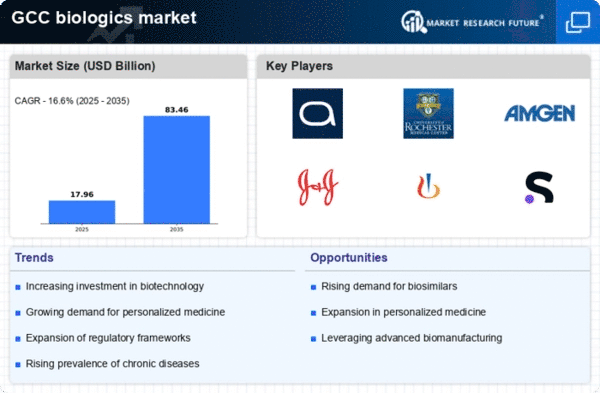Rising Prevalence of Chronic Diseases
The biologics market is significantly influenced by the increasing prevalence of chronic diseases in the GCC region. Conditions such as diabetes, cancer, and autoimmune disorders are on the rise, necessitating advanced therapeutic options. Biologics, known for their targeted action and efficacy, are becoming essential in managing these diseases. Reports indicate that the market for biologics in treating chronic conditions could grow by over 20% in the next five years. This surge is likely to drive investments in research and development, further propelling the biologics market as healthcare systems adapt to meet the growing demand for effective treatments.
Increasing Demand for Personalized Medicine
The biologics market is experiencing a notable shift towards personalized medicine, driven by advancements in genomics and biotechnology. This trend is characterized by the development of biologics tailored to individual patient profiles, enhancing treatment efficacy. In the GCC, the demand for personalized therapies is projected to grow, with estimates suggesting a market value increase of approximately 15% annually. This growth is fueled by rising healthcare expenditures and a growing awareness of the benefits of customized treatments. As healthcare providers and patients alike seek more effective solutions, the biologics market is likely to expand significantly, reflecting a broader global trend towards individualized healthcare solutions.
Regulatory Support for Biologics Development
Regulatory frameworks in the GCC are increasingly supportive of biologics development, which is a crucial driver for the biologics market. Governments are streamlining approval processes and providing incentives for research and development in biotechnology. For instance, the establishment of regulatory bodies focused on biologics has led to a more efficient pathway for product approval. This supportive environment is expected to enhance innovation and attract investments, with the biologics market projected to reach a valuation of $5 billion by 2027. Such regulatory advancements not only facilitate market entry for new products but also encourage existing companies to expand their biologics portfolios.
Growing Investment in Healthcare Infrastructure
Investment in healthcare infrastructure across the GCC is a pivotal driver for the biologics market. Governments are prioritizing the enhancement of healthcare facilities and services, which includes the establishment of specialized centers for biologics research and development. This investment is expected to facilitate better access to biologics and foster innovation within the sector. With projected healthcare spending in the GCC reaching $100 billion by 2026, the biologics market stands to gain significantly. Enhanced infrastructure not only supports the development of new biologics but also improves distribution channels, ensuring that advanced therapies reach patients in a timely manner.
Technological Advancements in Biologics Manufacturing
Technological innovations in biologics manufacturing are reshaping the landscape of the biologics market. Advanced techniques such as continuous manufacturing and process automation are enhancing production efficiency and reducing costs. In the GCC, companies are increasingly adopting these technologies to improve scalability and ensure consistent product quality. The integration of artificial intelligence and machine learning in manufacturing processes is also expected to optimize operations. As a result, the biologics market is likely to benefit from reduced production times and lower prices, making biologics more accessible to healthcare providers and patients alike.
















